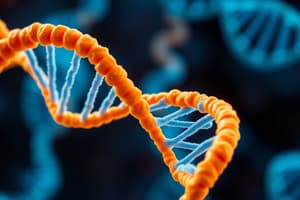Podcast
Questions and Answers
Which isoenzyme of CK is primarily associated with cardiac muscle?
Which isoenzyme of CK is primarily associated with cardiac muscle?
- CK-BB
- CK-MM
- CK-MB (correct)
- CK-ML
What is the significance of measuring CK-MB levels in patients?
What is the significance of measuring CK-MB levels in patients?
- It monitors kidney health.
- It helps in diagnosing heart diseases. (correct)
- It indicates muscle injury in general.
- It is used to assess liver function.
In which situations would you most likely see an increase in CK-MB isoenzyme levels?
In which situations would you most likely see an increase in CK-MB isoenzyme levels?
- Chronic liver disease
- Pulmonary embolism
- Myocardial infarction (correct)
- Severe dehydration
How does CK-MB differ from other CK isoenzymes in terms of location?
How does CK-MB differ from other CK isoenzymes in terms of location?
Which condition is NOT typically associated with elevated CK-MB levels?
Which condition is NOT typically associated with elevated CK-MB levels?
Flashcards are hidden until you start studying
Study Notes
Creatine Kinase Isoenzymes
- CK-MB is the isoenzyme primarily associated with cardiac muscle.
- It is a specific marker for detecting myocardial injury or infarction.
Importance of CK-MB Measurement
- Measuring CK-MB levels aids in the diagnosis of acute coronary syndromes.
- Elevated CK-MB indicates damage to cardiac tissue, helping differentiate cardiac from non-cardiac causes of chest pain.
Situations Resulting in Increased CK-MB Levels
- Post-myocardial infarction (heart attack) is a common scenario where CK-MB levels rise.
- Other situations include cardiac surgery, severe myocardial ischemia, and myocarditis.
Location Differences of CK Isoenzymes
- CK-MB is found predominantly in the heart, while CK-MM is related to skeletal muscle and CK-BB is linked to brain tissue.
- This distribution makes CK-MB a targeted biomarker for heart-related damage.
Conditions with No CK-MB Elevation
- Conditions such as skeletal muscle injury or rhabdomyolysis typically do not result in elevated CK-MB levels, as they primarily increase CK-MM instead.
Studying That Suits You
Use AI to generate personalized quizzes and flashcards to suit your learning preferences.




